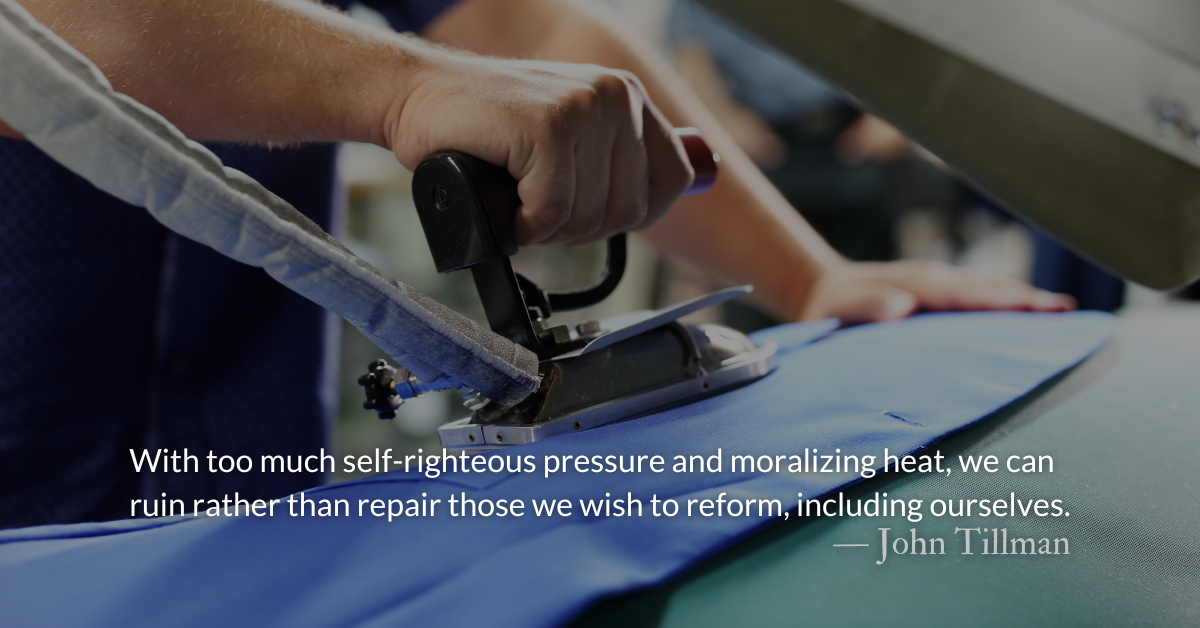Scripture Focus: Ecclesiastes 7.16-20
16 Do not be overrighteous,
neither be overwise—
why destroy yourself?
17 Do not be overwicked,
and do not be a fool—
why die before your time?
18 It is good to grasp the one
and not let go of the other.
Whoever fears God will avoid all extremes.
19 Wisdom makes one wise person more powerful
than ten rulers in a city.
20 Indeed, there is no one on earth who is righteous,
no one who does what is right and never sins.
“Darling, I don’t know why
I go to extremes
Too high or too low
There ain’t no in-betweens” — Billy Joel, “I Go to Extremes”
Reflection: Extremes of Moralism and Permissiveness
By John Tillman
Don’t be overrighteous? Don’t be overwicked? Is the teacher saying righteousness is overrated or a little wickedness is acceptable?
During seminary, I worked at a tuxedo warehouse, driving delivery vehicles packed with rental tuxedos to dozens of bridal shops across Tarrant County and beyond. I also put orders together, pressed them, repaired them, and sewed the hems of coats and pants to each customer’s measurements.
I learned that pressing a coat lapel with too much heat and pressure or pressing on a flat instead of a curved surface creases the lapel rather than allowing it to roll naturally. The look of a coat can be permanently damaged if the lapel is improperly creased.
I also spot-treated items that came back stained. Stains were common. People are generally not thoughtful or careful with rented clothing. Before sending items to the cleaners, we treated stains using harsh chemicals, high-pressure water, steam, scrapers, and brushes. More than once, determined to scrape out a stain, I scraped too hard and damaged the fabric.
The teacher recognized that perfect righteousness and perfect avoidance of wickedness were both impossible. He described the human pursuit of sinlessness as a self-destructive act. There is a level of religious fervor and moral strictness that destroys our souls rather than saves them. Works righteousness leads to damnation, not salvation.
Jesus takes sin seriously and so should we. It is unloving to allow ourselves or others to continue in sin. All sin damages the self and others. We should metaphorically cut off our hands and pluck out our eyes to avoid it, but more care should be taken when we turn to others.
When I have a splinter, I aggressively cut into my finger to get it out because I can feel if I am cutting too deep. When tending someone else’s splinter, I am gentle. Let us be cautious and sensitive. Judgmental legalism looks like holiness and righteousness but is its own form of wickedness and foolishness.
Heat and pressure, used properly, help clean and maintain clothing, but too much of either ruins rather than repairs. With too much self-righteous pressure and moralizing heat, we can ruin rather than repair those we wish to reform, including ourselves. Remember that pressing souls into shape and scraping away the stain of sin is the Holy Spirit’s job, not ours.
Avoid the extremes of moralism and permissiveness. They are both damaging.
Divine Hours Prayer: The Call to Prayer
God is King of all the earth; sing praises with all your skill. God reigns over the nations; God sits upon his holy throne. — Psalm 47.7-8
– From The Divine Hours: Prayers for Summertime by Phyllis Tickle.
Today’s Readings
Ecclesiastes 7 (Listen 3:37)
Psalm 58-59 (Listen 3:32)
Read more about Enter While You Can
Self-righteousness isn’t exclusive to the religious. Our culture strongly believes that humans are innately good, innately “righteous.”
Read more about Pause To Read
What can we learn from Jesus’ hotheaded disciples? Find out in our latest podcast episode. Don’t miss it.







